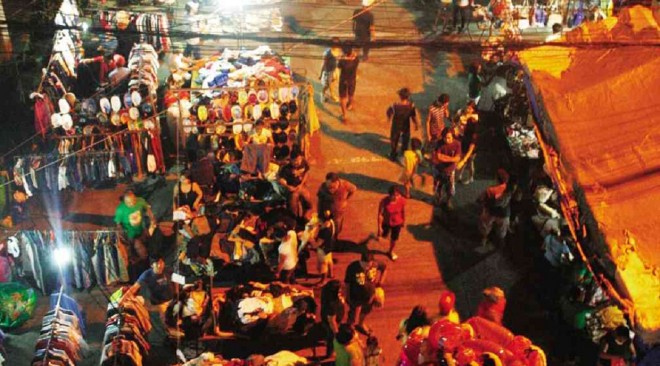Tagum’s longest ‘dining hall’

EACH night at 6 p.m., 1.5 kilometers of Tagum City’s streets turn into a night market offering food and goods. TAGUM CITY INFORMATION OFFICE
TAGUM CITY—At exactly 6 p.m. every day, more than a kilometer long of this city’s streets turn into a bustling dining hall—sweet-smelling smoke wafting from hundreds of grills set up in tents as a massive army of famished students, office workers and people from all walks of life troop to feast on various, affordable culinary fares.
Colloquially known as McDuko-duko (a tongue-in-cheek reference to a known fast-food chain; duko in Cebuano means leaning one’s head forward), the long array of barbecue stalls along six streets in downtown Tagum is the city’s most popular nocturnal gastronomical destination.
Located in the heart of the urban center, this forms part of the local government’s night market program (NMP), a decade-old effort to start a vibrant nightly tradition through livelihood for ambulant vendors that, according to officials, could help spur more growth in Tagum as an emerging tourism magnet in southern Mindanao.
Life-changer
“The program has benefited not only the local government in terms of revenue but also the people who are making their livelihood at the night market. It has a huge impact on people as it transforms countless lives,” said Mary Grace Terante, manager of the city economic enterprise office (CEEO), which runs the NMP.
One of them is 45-year-old Joey Vistal, who used to ride a bicycle with wife Jocelyn when he started selling barbecue on a single table along a dusty alley in Quezon Street 12 years ago.
Now, the former abantero (mine worker) drives a newly acquired Toyota Fortuner and uses a Kia Bongo pickup truck to buy raw materials for his barbecue stall.
“I was able to send two of my three children to prestigious schools in Davao. Our life was really transformed with the help of our business,” said Vistal, president of Night Market Vendors Association.
Vistal and his 47-year-old wife employ 15 stay-in workers, three of whom are college students.
“About 70 percent of the 300-plus vendors here now own a car or a four-wheeled vehicle. That’s how good our business here is,” Vistal said.
Local leaders came up with the idea of designating a permanent zone for night traders in 2003 in a bid to stop the chaos caused by ambulant vendors hawking their wares wherever it fits them, mostly along junctions of the Davao-Agusan highway, a lucrative yet crime-prone area to do business in, particularly at night.
Incidents of customers being mugged or held up by youth gangs armed with barbecue sticks were common.
Order in chaos
“Sanitation and hygiene were also poor and patrons had to contend with dust kicked up by passing vehicles as they eat at roadside stalls. It was really a sorry state,” Terante said.
Officials during the incumbency of longtime Mayor Rey Uy decided to put things in order and institutionalized the NMP, a move that ensured its sustainability.
“Instead of driving away these vendors, you put them together in a single, orderly place, while you help both the local government and these people earn,” Terante said.
A local law, City Ordinance No. 161, was passed in October 2004, further strengthening the program. The ordinance also authorized the closure of several streets to vehicle traffic, particularly those across food stalls.
But there’s so much to the city’s night market than the barbecue stalls. Along Quezon Street, balut (boiled fertilized duck egg) stalls could be found. Ukay-ukay (used clothing) and other ready-to-wear items are also being sold. Street-food lovers can have their fill at kwek-kwek (fried, breaded pigeon eggs) stalls along Osmeña Street, beside the city’s Freedom Park.
Mobile phone accessories, gadgets and other trinkets can also be bought in stalls along Bonifacio Street.
Tagum’s night market is comparable to Thailand’s where thousands of tourists flock yearly.
“Ours is all year round. From 6 p.m. to 2 a.m. the next day, downtown Tagum is transformed into a virtual mall, pulsating with activity where thousands go to eat, to shop and to relax,” Mayor Allan Rellon said.
To date, the night market program has 317 registered vendors and small-scale entrepreneurs, employing a total of 1,268 people, mostly parents, data from the CEEO revealed.
Rellon said the city government spent just over P500,000 last year and collected over P6.6 million in fees, a testament to the program’s efficiency as a local revenue source.
Feasibility
The mayor said the night market characterized a “participatory form of governance” as the entire community—from watchmen and other volunteers as well as the vendors themselves—helps in the maintenance of peace and order, making the night market a safe place to dine and shop.
“We can really say the program is feasible. The cost benefit is huge, effective and efficient because our collection increases yearly. We were able to collect over P6 million compared to our expenses, which were just P500,000 for the salaries of our market chief and three collectors. You spend less; you earn big,” the mayor said.
The CEEO data revealed that food stalls were earning an average of P6,000 per night this year, an increase of more than 600 percent from 2003, a year before the NMP implementation. Used-clothing businesses earn an average of P1,500, up from P800 some 10 years ago, while balut vendors earn as high as P2,500 a night.
Rellon said the program demonstrated good governance in the aspect of accountability, one of the criteria that earned it one of this year’s 10 Galing Pook Awards.
It was the first time Tagum clinched the award in the last five years. The local government, under Rellon, defended Tagum’s nomination before the national screening committee of Galing Pook Foundation in Quezon City on Aug. 15.
“There is a strict check and balance to ensure daily market fees are religiously collected and remitted to the local government,” Rellon said.














